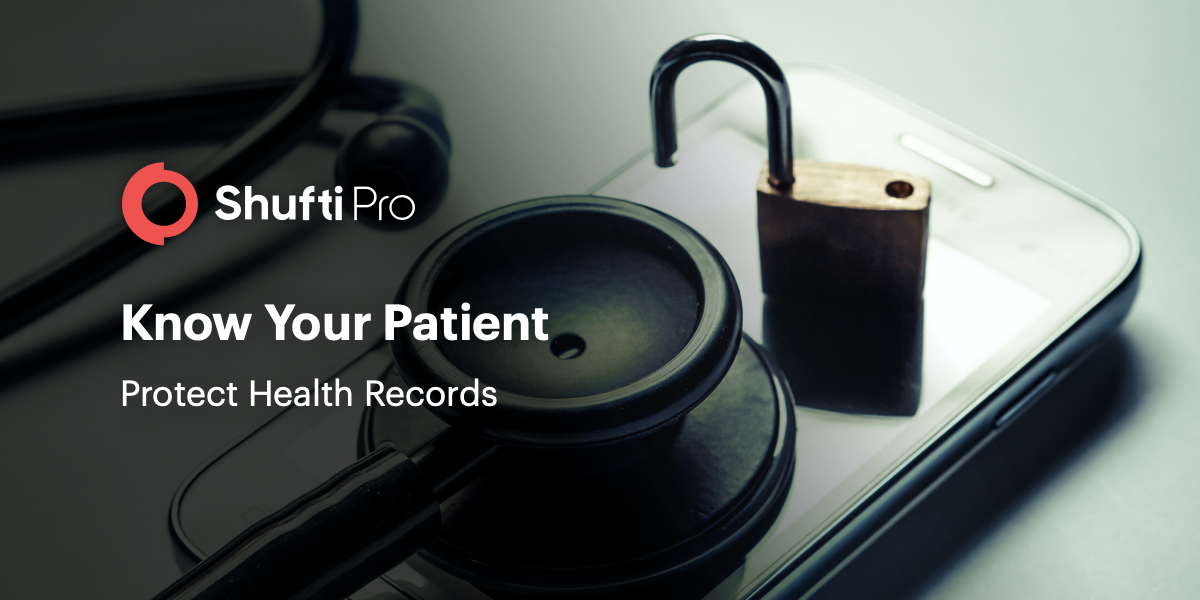Know your patient process explained [Under the GPhC’s guideline]

How to make sure that the patient qualifies for purchasing a restricted medicine?
Or
Someone requesting the results of a blood test online is who they claim to be?
Know Your Patient (KYP) is the process that helps verify the identity of patients. This article highlights how your business can carry out this process.
Towards the end, it mentions use cases that might apply to your healthcare business.
What is Know Your Patient (KYP)?
Ever wondered why doctors and other medical offices require patients to show identification?
The medical staff needs to know who they are treating, much like a bank performs ‘know your customer’ or the KYC process when someone applies for a loan or to open a new bank account.
There are several reasons why hospitals require credentials from patients. For example, to secure medical data, to prevent health insurance fraud, and to protect the patient’s identity.
Digital identity verification in healthcare plays a crucial role.
The General Pharmaceutical Council (GPhC) of the UK issued Guidance for registered pharmacies providing pharmacy services at a distance, including on the internet, in April 2019.
The summary of GPhC’s guide is that online medical stores need to verify the identity of patients before selling opiates, or medicines for diabetes, asthma, and epilepsy.
So how to ensure that the online order for a diabetes medicine is placed by someone having an authentic prescription from a qualified doctor?
Online identity verification solutions can address this problem.
Seemingly, KYP is a restriction for drug stores but it also benefits the healthcare providers regarding the protection of patient data.
We wrote in our previous post, Anti-Fraud Pill for Healthcare Industry, how data breaches have damaged the healthcare industry.
KYP protects both the patients and healthcare providers.
It is not only the patients that need to demonstrate credentials before buying, the ID verification for pharmaceutical businesses is also mandatory.
Identity theft is not only prevalent in the financial and eCommerce industry, but healthcare sectors are also its primary targets. Our article, Medical Identity Theft, elaborates on how this menace has penetrated the medical industry.
And the result is that the requirements for ID verification for pharmaceuticals all over the world are getting stricter.
Digital ID verification for pharmaceutical in the United Kingdom
Pharmaceutical solutions keep extremely personal and sensitive data, which makes it crucial for their ID verification. On the dark web, a patient’s history or medical record holds more worth compared to someone’s credit card detail.
This makes it imperative for pharmaceutical services to confirm patient identity before selling medicine listed by the health care regulators.
It may seem like a burden on the hospital dispensaries to verify customers but digital solutions exist that verify patients in 15 seconds. Yes, not every solution provider gives the same quality.
However, healthcare providers need to get trusted IDs for real-time verification.
How to verify patient identity
Patient identifiers help with KYP process. With tools such as face- or document verification, pharmacies can record unique features and patients’ data. This ensures that the person is who they claim to be, and ascertains a legitimate request to obtain medicine or medical test results.
ID verification of patients also helps prevent fraud while preventing the misuse of stolen medical data.
ID verification for pharmacies
As mentioned earlier, pharmacists need to possess a proper license to operate and sell medicine. Consider it two-way traffic. An actual patient who walks up to a pharmacy that is not licensed can misuse a person’s data. The first step is perhaps patient age verification.
Verifying patient age can be similar to the age verification process extensively being used by online gaming or other age-sensitive sectors of different industries.
Depending on the region, there are several ways verification of patients can help pharmacies meet compliance requirements.
Use Cases
KYP has several use cases that help protect the patient’s identity and assist healthcare businesses in ensuring that they are providing the medical test results to the rightful owner of that sensitive information.
Age verification for online prescriptions
How to know the age of a person standing in the drug store or ordering online? Under the latest guidelines, online pharmacies in the UK are required to perform age verification for anyone seeking prescription online.
Verifying their age with a government-issued identity document is one way to achieve that.
Preventing insurance fraud
When a patient’s data is compromised, the identity thief can falsely claim insurance using the health insurance ID. The fraudster swindles the claimant, making it difficult for them to file a claim.
What are the procedures to verify patient identity?
Know Your Patient process is similar to standard identity verification. Businesses can use it to open an account or confirm the identity of someone who has ordered medicine online.
The KYP steps are:
1. The online user or patient uploads a picture of their government-issued identity document such as a driver’s license, passport, or simply an ID card, using a smartphone or webcam.
2. Next, they upload a live selfie which creates a 3D face map. This is important since it ensures that the person creating or accessing the account is who they claim to be.
3.Verify that the ID document is real, valid, and original. Match the person’s picture in the selfie with the picture on the ID.
4. Ensure that the patient meets the minimum age requirements. You may also run a background check on the document to see if they have been involved in fraudulent activity.
5. Evaluating the results from the above 4 steps, hospitals, pharmacies, and medical offices can accept or reject the request for a new online account and supply order(s) for medicine(s).
Ongoing KYP with biometric authentication
After the initial screening, pharmacies and clinics can accept/reject future requests for online purchases from a simple selfie.
The process is simple; at the time of creating the account, a 3D face map of the person is created using facial recognition technology.
So every time the user wants to request online purchases or medical test results, they can simply send their live selfie.
This selfie is matched with the 3D map of their face captured at the time of enrollment, authenticating patients with selfies.
Going forward, the regulations for medical facilities and pharmacies will become more challenging. There will be more scrutiny as the COVID-19 lockdown phase has highlighted how important online businesses are especially in the time of a crisis like that.
Online pharmacies can simply ask the patient to verify ID online before entertaining their request.
Patient identification through KYP process is helpful for society at large. Medical health records stay safe and minors are prevented from ordering restricted medicine online. However, a user friendly Know Your Patient process can benefit healthcare businesses and the patients.
Recommended for you:











